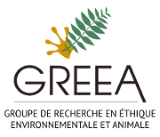December 17 – Video conference of Elena Casetta, Università di Torino – « Naturalness as independence: a theoretical framework for nature conservation »
Elena Casetta from Università di Torino (Italia) will give a video conference at GRÉEA on « Naturalness as independence: a theoretical framework for nature conservation »
Tuesday, December 17, 10.00 am-12.00 pm
Carrefour des arts et des sciences, room C-2059
Lionel-Groulx building, 3150 Jean-Brillant Street
Université de Montréal, Montreal
The presentation will be in English with the discussion period in English or French.
Abstract
In common language, we ascribe several significances at the term “nature”. Two are particularly relevant in the context of nature conservation: “nature” as the subject-matter of physics or natural sciences (i.e. “natural” as opposed to “supernatural”); and nature as contrasted with art, craftwork, or culture (i.e. “natural” as opposed to “artificial”). The first meaning does not imply a counter position between human beings and the rest of nature, human beings and the products of their activities are just a part of nature. However, if we place ourselves within a definition of nature, the definition becomes essentially meaningless by extending to everything on Earth. The second meaning, on the contrary, does imply a counter position between human beings and the rest of nature: something is natural if it is independent of our making or if it is untouched by our activities. Yet, if nature is defined by our absence, then, because of the pervasiveness of our species and its activities, there would be simply no nature left to be conserved. Shall we just get rid of “nature” and “natural” from conservational discourse? I do not think so. I am going to argue that nature conservation seems to require a more dynamic view of the relation between nature and our species. I will sketch such a view and I will consider its possible merits in the light of some examples.

 Previous Post
Previous Post Next Post
Next Post